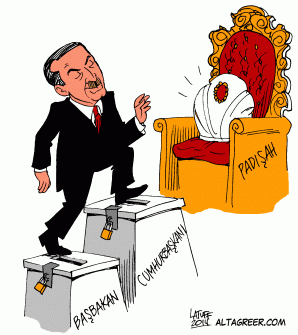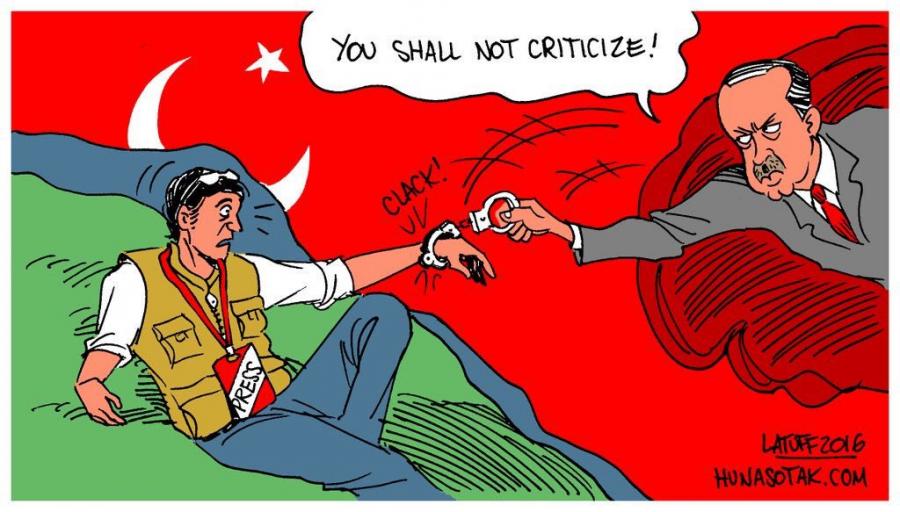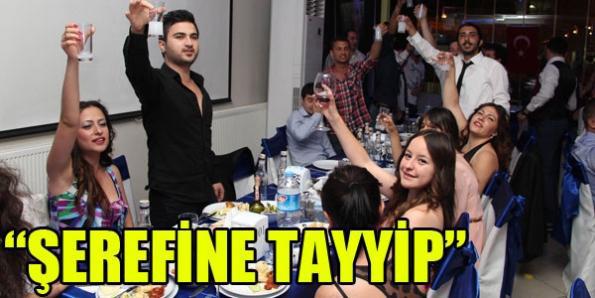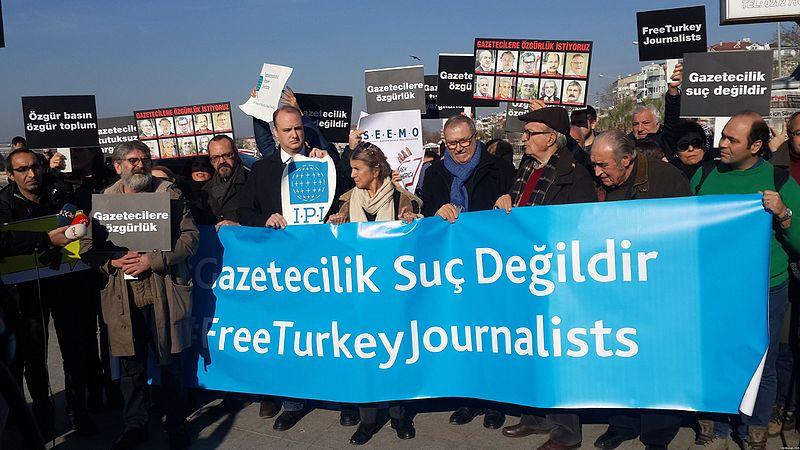
Recep Tayyip Erdoğan: Old “New Turkey”
How should we understand the legacy of Recep Tayyip Erdoğan? This article answers this question. when we see that Turkey changed rapidly, moving away from the reforms of kemalism and pluralism towards Islamic populism. Governed through the nationalistic AKP (Justice and Development Party), religion has become more important, playing a greater role in the State.
Who is Recep Tayyip Erdoğan?
As the former Mayor of Istanbul (1994-1998), Prime Minister of Turkey (2003-2014), and the founder of the AKP (2001) - one of the biggest conservative parties in Turkey - Erdoğan is an experienced politician. Coming from an Islamic background, he describes himself as a conservative democrat. As president of the Republic of Turkey and the chairman of the AKP, we can corroborate his political identity based on his own statements and the values that are important to him, which can be found in what the AKP stands for. He himself has described the party as a “democrat and conservative party.” (Diken, 2017). To understand the ongoing political developments, we need to analyze the image and vision Erdoğan is creating for both himself and the future of Turkey. The conceptual tools driving his communication and style of governance are crucial in understanding both his reasoning and the decisions he may make as a result.
Since 1923, Turkey's political regime has been a parliamentary government. However, in April 2017, the current president, Recep Tayyip Erdoğan, set up a referendum regarding the political future of the country. As a result, from 2019 on, Turkey will be governed by a presidential system that is expected to bring about an expansion of presidential powers.
When analyzing Erdoğan, we should take into account that he has been politically active for several decades. His time as a politically engaged individual can be separated into three distinctive ‘periods.
In the 1990s, Erdoğan was considered to be an Islamic fundamentalist; this was demonstrated in his public speech of 1994 where he stated that: “We will bring fair order sharia back. We will rule the country with the rules of God. We will not buckle under the West or America and their rules but will take the moral of the East. Whether you want it or not, we will bring our own sharia with peace.”
His flowery speech underlines his aims to create an Islamic society. An additional prominent example was the 1999 incident whereupon he was arrested for reading the poem “Soldier's Prayer” by Ziya Gökalp. By changing some verses for religious emphasis, this can be seen as a religious nationalistic speech as well as an attempt to lead the country away from democracy and the rule of law.
Minaret is the bayonet, domes are helmet,
mosques are our barracks, Muslims are our soldiers,
this divine army is waiting for our religion,
saying Allahu ekber.
In line with the first EU-accession negotiations a few years later, Erdoğan enters his second period expressing himself as a pro-European modernizer. Initially, the accession talks were symbolic in demonstrating that Turkey had become a fully secular and democratic nation - able to achieve the values that the European Union held dear.
The negotiations seemed to push Turkey further towards Western values. However, many also saw Turkey’s democratic reforms as superficial, undertaken on paper to impress European decision-makers. This resulted in the talks proceeding painstakingly slow, leading to the growing anger of the ruling elites in Turkey. Under the illusion that Turkey had been taken advantage of, the warm feelings of hope were quickly replaced with hostile discourse against Europe.
With the failure of the accession talks and residual resentment towards the EU, Erdoğan enters his third phase. In 2017, President Erdoğan mentioned that “Turkey has been patient since the application was made in 1959, but the EU misunderstood this patience… we will not be the party throwing in the towel. However, we do not need the EU membership any more”.
When Gareth Jenkins, a writer and analyst based in Istanbul, was asked in an interview in 2010: “What does he [Erdoğan] really want? If he had full rein?”, he replied: “He would accomplish a more Muslim society in Turkey, and establish Turkey as the leader of the Muslim world” (Kalnoky, 2010).
What is Erdoğan’s message?
To figure out how politicians want to demonstrate their political persona, politicians’ messages play a big role. However, their message in politics has a broader meaning than its use in daily language; Lempert & Silverstein explained this complicated notion as “It is not the topic or theme what someone is literally communicating” (Lempert & Silverstein, 2012, p.2). The combination of images of a politician, while communicating on several issues creates the message of the politician as Lempert & Silverstein define it: “A politician’s persona becomes visible as a collage-in-motion of communicative Issue events: through becoming identified in this way with issues, he or she acquires a political persona” (Lempert & Silverstein, 2012, p.3). In this section, we will analyze Erdoğan’s message through his political life and one of the biggest resistance movements, Gezi Park.
Erdoğan and the government’s language surrounding the controversial reconstruction of and the protests in Gezi Park, reconstructed Erdogan's message in the eyes of the world. Their speeches always contained the subtext that it does not make sense to participate in protests, as the government has already made a decision regarding the reconstruction of Istanbul’s city centre. However, this is not the only message being peddled by Erdoğan, as aside from the idea that protesting is pointless, the government argues it is also senseless. The government knows what is right for the country and protesters are just a minority. Erdoğan wants the people to understand this message loud and clear: authority lies solely with the government, protesting is pointless, futile, and demonstrates ignorances. The government, and more in particular Erdoğan himself, is the voice of the people.

“Prime Minister - President - Sultan”
Whilst his early reactions focused on creating a negative image of the resistance movement, he swiftly moved on to create a more positive image for himself: "Our patience is at an end. I am making my warning for the last time. I say to the mothers and fathers please take your children in hand and bring them out ... Gezi Park does not belong to occupying forces but to the people." In order to spread his message, Erdoğan uses rhetorical devices which can be classified as belonging to a populistic communication frame. By stating that Gezi Park belongs to “the people”, Erdoğan positions himself in the discourse as the ‘man of the people’, acting with them and not acting against them. This helps garner him further support amongst the masses.
However, he has often been, and still is the recipient of criticism by many of his countrymen and women; as well as a recipient of criticism at an international level. As president, he was responsible for implementing censorship through blocking multiple websites (e.g. newspapers, and sites criticising or even mentioning censorship in Turkey) along with social media networks such as Twitter and YouTube (Scott, 2014). Currently, more than 150 national and international journalists are imprisoned in Turkey, and therefore, the organization Freedom House has classified Turkey’s press as “not free” - giving the country’s press freedom a total score of 76/100 (100 = least free). Consequently, many people are concerned about the ongoing political developments and the trend they seem to show.

Nevertheless, the ongoing support for his leadership and an authoritative presidential system will help Erdoğan further along his path in establishing a “new Turkey” based on a new type of nationalism; a nationalism that is not grounded in Kemalism, but in Ottoman history and Islam.
Is that enough to call him a religious nationalist?
In the past, growing efforts towards the Islamization of Turkish society have largely been unsuccessful. However, under the leadership of Erdoğan, progress is finally being made. Preliminarily, it has made the most progress as part of a roll out into the educational system. This is seen as the AKP’s reforms have expanded the religious content of regular academic high schools. Over the course of 15 years, both the student placement system for universities and the curricula of schools have been changing continuously. Rather than focusing on how to improve the educational system, the ministry of education and the government were mainly concerned with increasing the influence of religion.
Religion now plays a substantial rol in the educational career of Turkish children. For several years, it wasn’t compulsory for students to answer religious questions in exams, and the effect of these questions was minimal. However, new orders under Erdoğan have led to an increase in the importance of Islam. Not only are religion classes now compulsory from elementary school onwards, their effects on exams have also increased (Diken, 2017). In addition to emphasising and consolidating the role of religion in classes, Alpaslan Durmus, the head of curriculum for the ministry of education, called Charles Darwin’s theory of evolution “controversial” and announced plans to remove it from school programmes by 2019 (Sanchez, 2017). This seems to be in line with the observations Weise (2017) made; she calls: “Turkey’s new curriculum: More Erdoğan, more Islam.”
Furthermore, the government has been making additional modifications on the education system through increasing the number of Imam Hatip schools and religious vocational high school, both of which aim to raise new imams. Since the AKP’s election success in 2002, enrollments in these schools has surged from 63.000 pupils to one million (Weise, 2017). Erdoğan mentioned that he appreciates the Imam Hatip high schools becoming more active and visible during his term of power (Hürriyet Daily News, 2015). According to him, these schools “will be the apple of the Turkish people” (Haberleri, 2012). This demonstrates how precious and valuable he considers these Imam raising institutions for Turkish citizens and this also supports the argument that the current president follows a nationalistic ideology which is based on religion.
Meanwhile, as the curriculum is changed, new reforms to alcohol laws support Erdoğan’s image as a religious nationalist and highlight his message for changing the country to a more Islamic one. Specifically, the illegalization of alcohol increased in the last decades, during the AKP government. In 2013, the government passed a bill to limit the selling of alcoholic beverages between 10 p.m. and 6 a.m. (Hürriyet Daily News, 2013) According to sharia law, Muslims are not allowed to drink alcohol. Therefore, this ban enshrines sharia law in civil law. Except from a person's residential area, it is illegal to consume alcohol or sell it in locations such as dormitories, health organizations, stadiums, sport complexes, educational institutions or patissieres (Hürriyet Haber, 2014).

“In honor of Erdogan” (haberekspres). People shared many posts and photos on social media to protest the ban of alcohol.
Less than two years later, a second attempt followed: Antalya’s governor’s office banned drinking alcohol, even in a city which is an international hub of tourism for Turkey (Stockholm Center for Freedom, 2017), for instance in “parks, beaches, picnic and camping sites, open air public areas, historical sites [or] city squares” (ibid).
Freedom of what?
Erdoğan not only wants girls and boys to be educated in different school buildings, according to Islamic rules, but he has also further interfered in women’s rights. In an interview given in 1985, he mentioned that “woman should stay at home and not participate in politics rather than voting” (Birgün, 2017). Contrary to what the Enlightenment tradition suggests, this aims for the restriction of freedom and the removal of equality.

“School Canteen - Boys & Girls”. Discrimination of girls and boys has started even in school canteens in many schools of the country after the speeches of Erdogan.
Such suppression happened for instance when Turkish academics published a statement inviting the government to take the necessary steps for peace and demanded to end the violence between Turkey and the PKK (Kurdistan Workers' Party), which is considered to be a terrorist organization). After the paper was published, those academics who have signed the statements were subjected to harsh criticism from the government and from the media. An investigation was conducted and three academics were arrested. Later, many academics were dismissed from their universities.
Both of those examples touch on the principle of “equality”, which is a main element of the Enlightenment. The Turkish government’s decisions were not following this tradition, but rather its opposite, the Anti-Enlightenment. So, how can those acts be described in the ideology of Anti-Enlightenment? The Anti-Enlightenment is an ideological movement that contradicts the ideas of liberalism, socialism and anarchism and, therefore, works towards a different kind of modernity, based on inequality, which rejects the principles of the Enlightenment, rationalism, universalism and restricts the freedom of people.
Erdoğan is therefore a typical Anti-Enlightenment conservative, who appropriates a democratic image for himself through his populist discourse.
This restriction of freedom becomes obvious in the way Erdoğan deals with criticism and especially in his policies and actions against the media. Erdoğan sees social media as a growing political threat. In trying to regain control, he came up with a repressive Internet law that allowed the President of the Telecommunications Communication Presidency (TIB) to close any web content within four hours. Moreover, he has worked hard to put the Turkish press under government control for years. This has been successful to some extent, by allowing businessmen close to him to buy large newspapers and television channels. However, Turkey still desires to remain an open society in terms of access to public information, especially social media.
Erdoğan's troubles with social media began with the protests in Gezi Park. This anti-government rebellion movement was organised through social networking sites such as Twitter. Twitter’s usage during the Gezi Park movement played a key role, because media channels were under pressure from the government, and there were only a few TV channels that reported about the Gezi Park incident. Hence, protesters used Twitter as an independent form of media to remain informed, as well as to support each other. In addition, AKP supporters and apolitical people could easily be influenced by the news during Gezi Park, as the TV channels showed highly biased information and portrayed the protesters as though they were the enemies.
Banning social media platforms did not stop the people, especially the journalists. However, Erdoğan did not like the fact that they are still criticizing him. So, he sentenced hundreds of journalists to prison in the last decade, not only local journalists but foreign journalists as well (Akyol, 2015).

Turkish journalists protesting against imprisonment of their colleagues in 2016.
Banning social media platforms without a valid legal reason or arresting journalists actually violates freedom of speech and thought, which is not acceptable in democratic countries. However, the decisions the Turkish government has made during the last decades can’t be labeled as respectful decisions with regards to people’s fundamental rights and thus can be seen as anti-democratic decisions. Only within the ideology of the Anti-Enlightenment it is possible to reject democracy, rationalism and the most fundamental building block of the Enlightenment ideology: equality. Equality, freedom of speech, religion, debate, art and politics are instruments of the enlightenment tradition that give people the chance to build their own world within the scope of democracy. An ideology such as the Anti-Enlightenment, which rejects all of these things, drifts away from democracy itself. Arresting journalist or banning social platforms doesn't encourage people to express their ideas freely and openly, which should be possible in a democratic country.
Considering the way Erdoğan has reacted to his opponents, the suppression of the protests in Gezi park, his ban on social media platforms, the arresting of journalists, he can’t be accepted as a democrat, although he describes himself as a “conservative democrat”. This description makes very little sense, however, since the enlightenment notion of democracy was hated by conservatives in the past. Erdoğane can be considered an authoritarian ruler and may be a dictator. A democrat, who has respect for freedom of speech and freedom of thought doesn't simply arrest people for having an opinion different than that of himself.
Erdoğan as an anti-Enlightenment conservative
Even though the political position that Erdoğan communicates slightly changed throughout his life, he has recently been very to the point with his policies, since he has started to receive almost half of the nation's vote through the elections. For the three general elections when Erdogan represented AKP as chairman, he gradually gained more and more votes and when he was elected as president he received 51,79% of the votes. Having won all these elections naturally gives him the idea of being a very powerful force to be reckoned with indeed, which as made Erdoğan care less about the opposition or others’ will.
Since one of the characteristics of the Anti-Enlightenment ideology is being against democracy, Erdogan’s image and message, being authoritarian, draw a frame for him that suits the ideology perfectly. Banning social media platforms, arresting journalists and academics and ignoring the role of women in society cannot be connected to a democratic state or a politician representing a democratic state.
Erdoğan is therefore a typical Anti-Enlightenment conservative, who appropriates a democratic image for himself through his populist discourse. However, he undermines the basic principles of the democratic ideology: equal rights for all, freedom of the press, the right to resist and protest as well as freedom of religion and education.
References
Lempert, M., Silverstein, M. (2012). Creatures of politics: media, message and the American presidency. Bloomington: Indiana University Press.
Mudde, C & Kaltwasser, C. R. (2017). Populism: A Very Short Introduction. Oxford: University Press
Sternhell, Z. (2010). The Anti‐Enlightenment Tradition. New Haven; London: Yale University Press.